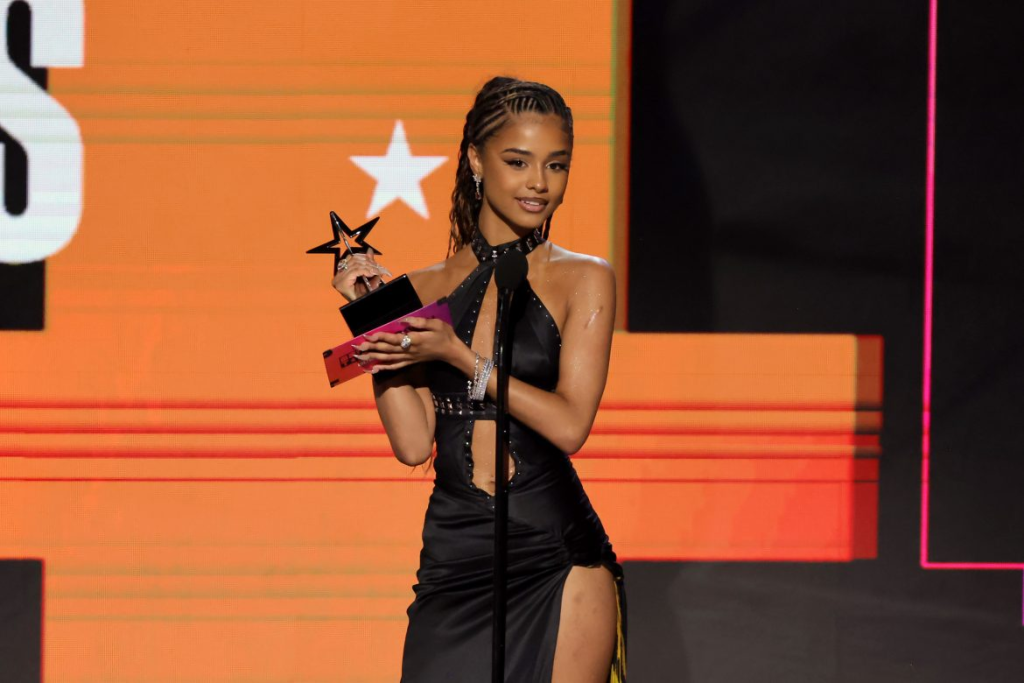The recent uproar among music lovers regarding the gentrification of Afrobeats has reignited concerns about the genre’s future amidst its global popularity. This debate stems from the 2024 Billboard Music Awards, where the nominations included songs and artists that do not entirely represent the essence of Afrobeats.
The inclusion of Tyla, a South African artist, and her three singles—Water, Truth or Dare, and Jump—in the Best Afrobeats Song category, alongside her nomination as a Top Afrobeats Artist, has fueled discussions about the genre’s trajectory.
While Nigerian superstars like Rema, Burna Boy, Tems, and Asake also secured nominations, the category for Best Afrobeats Song has drawn the most criticism. The nomination of Move by German DJ Adam Port and American-based producer Stryv, featuring Malachiii, has been viewed as problematic.
This track, despite being placed in an Afrobeats category, lacks any Nigerian creative input. Its arrangement leans heavily toward Amapiano and House music while borrowing elements of Afrobeats delivery.

The inclusion of such tracks has intensified fears that the genre is at risk of losing its identity. Many observers have drawn parallels with genres like reggae and dancehall, which experienced significant cultural shifts after being embraced by global audiences. The example of Caucasian artists winning Grammy awards in these categories is often cited as a cautionary tale.
Similarly, Afrobeats enthusiasts worry that the absence of proper gatekeeping could lead to the erosion of the genre’s cultural roots. Tyla’s dominance in these categories has also raised questions about authenticity.
While her success as Africa’s most prominent artist in the United States in 2024 is undeniable, her relationship with the genre has been contentious. After winning the Best Afrobeats category at the 2024 VMAs, she publicly disassociated herself from the genre, identifying instead with Amapiano.
Despite her subsequent acknowledgment of Afrobeats during her acceptance speech at the 2024 EMAs, this statement has contributed to calls for stronger measures to protect the genre’s integrity.

The recurring nominations of artists and songs that do not fully embody the Afrobeats sound have highlighted a growing trend. Renowned music journalist Joey Akan has been one of the most vocal critics of this phenomenon. He argues that the genre risks losing its unique identity if foreign actors continue to influence its narrative without adequate representation from its cultural origins.
He cited the nomination of Chris Brown’s Sensational, featuring Davido and Lojay, at the 67th Grammys for Best African Song Performance as an example of how external involvement is shaping the genre.
While the international success of Afrobeats has been celebrated as a milestone for African music, it has also exposed vulnerabilities. The incorporation of Afrobeats elements by artists outside the continent, without meaningful contributions from Nigerians, is seen by many as the first step toward its gentrification.
This pattern has raised critical questions about ownership and cultural preservation. The fear that Afrobeats could follow the trajectory of other genres that have been “hijacked” is not unfounded. The global music industry’s history of assimilating and repackaging cultural expressions for mass consumption is well-documented.

To avoid this fate, advocates like Akan emphasize the need for deliberate gatekeeping to ensure that the genre remains true to its Nigerian and African roots.
The controversy surrounding Tyla’s nominations, and the inclusion of Move in Afrobeats categories reflects the challenges of defining the genre in an increasingly globalized music industry. The balance between inclusivity and preservation is delicate, and the current uproar highlights the importance of maintaining that equilibrium.
As the genre continues to gain international acclaim, the responsibility of preserving its authenticity falls on both creators and consumers. The global audience, while celebrating the diversity Afrobeats brings, must also recognize the importance of its cultural significance. By supporting original works that reflect the essence of Afrobeats and questioning decisions that undermine its identity, fans can play a vital role in this effort.
The gentrification of Afrobeats is not an inevitable outcome of its global popularity. However, addressing the challenges it faces requires intentional actions and conversations. Protecting the genre’s identity while allowing it to thrive on the international stage is a complex task, but one that is essential for its continued success. By acknowledging its roots and prioritizing its cultural authenticity, Afrobeats can navigate its global journey without losing the essence that makes it unique.
We’re amazed to have you as a member of our community. Your time here means so much to us. Just to let you know, we organise workshops, seminars, and youth engagement programmes. Therefore, we indulge you to partner with us for sponsorship and other forms of social enterprise. Find other related articles on our website and follow us on Instagram @InsideSuccessNigeria for more updates.
Thank you!



Leave a Reply